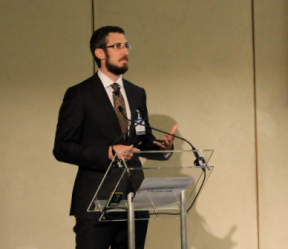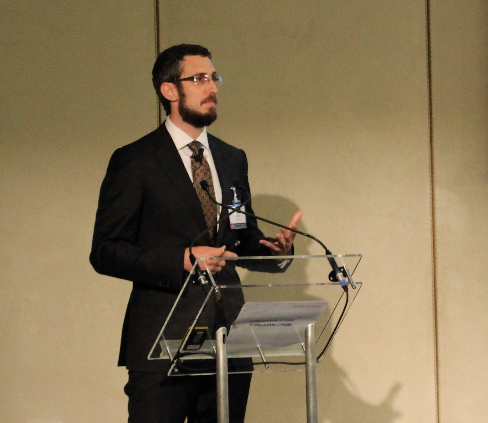by John Levy, CFA, Franklin Templeton Investments
Because an intern didn’t show up for work, John Levy, Director of Impact, Franklin Real Asset Advisors, got his foot in the door at Franklin Templeton. Now, 14 years later, he’s leading the firm’s efforts in impact investing, helping the company prove itself as a leader in the space. Get to know John.
 Q: What has been your career journey at Franklin Templeton?
Q: What has been your career journey at Franklin Templeton?
A: After graduating from college, I returned to my hometown of San Mateo, California, and began to look for a job. There were no opportunities for new graduates at the time I applied for a position at Franklin Templeton, but when an undergraduate intern didn’t show up that summer, I was asked if I would be interested in that position. I jumped at the chance.
Before I knew it, I was a summer intern turned into a fall intern, and then eventually I applied for a role as an analyst on what is now Franklin Templeton’s Multi-Asset Solutions (FTMAS) team. I was with FTMAS for 10 years, moving into a portfolio manager role and then later as director of the research team.
While I was with FTMAS, I got the impact investing bug. For the first time, I saw how robust processes and sound logic were deployed to find the ways capital can be used for good. Practitioners in the impact space rigorously pursued measurable outcomes that went beyond just feel-good measures. That’s what got me excited about impact and I decided I wanted to devote my career to it.
It dawned on me that with the firm’s focus on innovation and growth, plus our global footprint, Franklin Templeton is positioned to pursue impact strategies that can positively contribute to the space of impact investing and its growth.
In January 2018, I joined the Franklin Real Asset Advisors team to build the entire framework and process for impact management within our first strategy. Impact investing is just one part of Franklin Templeton’s overall commitment to responsible investment offerings.
Levy Defines Impact Investing
Impact investing is about making “win-win” investments where an intentional positive social and environmental outcome is pursued in parallel with a financial return.
Investors think of it as a “dual return” strategy, where they care about the financial return but also the societal or environmental return, and that return must be measured and managed.
Impact investing challenges the old paradigm that you invest first to make money, and then once you get enough money you give it away to make the world a better place.
We think it’s no longer a tradeoff. It is possible to simultaneously help the world tackle its largest problems and achieve an attractive investment return.
Q: What are your day-to-day responsibilities in your current role?
A: As Director of Impact, I have two main roles.
The first is leading our efforts to create a positive impact in our social infrastructure strategy, which invests in hospitals, clinics, schools, universities, affordable housing and civic buildings. Our process starts with measuring impact because what can be measured can be managed, and then what can be managed can be optimised. Our job is to find how our investment and our active ownership of properties can contribute to stronger communities and a sustainable environment.
Second, we work across the organisation to find new opportunities to create impact-focused investment strategies. We want to look beyond this first strategy and to think about how FT can do more in the impact space.
Q: What are your goals for impact investing at Franklin Templeton?
A: I want Franklin Templeton to be a leader in impact investing, which is a subset of the broader universe of sustainable and responsible investing. When we look at the firm today, we talk about the need for asset growth, innovation and employee engagement.
We also think about how to be the asset manager of the future, focusing on younger generations and putting clients first. I think impact investing checks all of these boxes. It’s growing fast, it’s innovative to its core, it’s engaging to discuss, and it responds to what more clients are asking for. What’s exciting is that impact investing goes beyond simply associating ourselves with companies and investments that are doing well. It’s also the ability to play an active role in contributing to positive societal outcomes.
With the way our firm is set up globally, we have an opportunity not only to succeed in this space but to help define it and be thought leaders.
Q: What has helped you succeed in your career?
A: I’m rarely content. I’m happiest and simultaneously most stressed when I’m challenged and when I am pushed to grow professionally.
I’ve been lucky to be surrounded by leaders and colleagues who have always put me in positions to prove I can do more. I think that’s critical to success. Success is never owned solely by the individual. It always comes from being supported by others, and I have been fortunate throughout my career at Franklin Templeton to have advocates who believe in me. I’m driven by a feeling of obligation not to let down those individuals who have put their faith in me.
Q: Why is impact investing important?
A: We have found individual investors and large institutions alike are interested in impact investing.
It’s critical for us to grow in a space that is growing and to position ourselves to be a firm of the future—and impact investing is one of the ways we can do that. It should be a part of our broader responsible investing approach, which also includes environmental, social and governance (ESG) and other thematic products.
Our approach is to provide an attractive strategy regardless of impact, but to give the bonus of positive social and environmental impact on top of a successful strategy.
We get to throw in this kicker for traditional investors. We can say, ‘You could get the same return elsewhere, but we can also provide positive social outcomes, so why wouldn’t you invest in us?’
Q: What keeps you engaged outside of work?
A: My wife and I are both very high energy, which means our two kids are double high energy. We spend most of our time playing games, playing sports—just doing everything we can together.
My wife and I are very engaged with the school our kids go to. I spend a lot of time cleaning the school, putting on movie nights and helping make food and organising fundraising events.
I look forward to starting to travel more with my kids as they get older. I have been able to see a lot of fantastic places across Europe, Asia and Australia for work and I want to take my family to these places and show them the diversity of the world.
Q: What was your dream job as a kid?
A: I wanted to be a naval aviator. I was interested in planes for most of my youth, but it faded over time when I realised I wasn’t going to be Tom Cruise from Top Gun. Plus, I’m too tall and I don’t have perfect vision, so if I joined the US Navy, I was unlikely to be a fighter pilot. Instead, I studied economics and political science—safer pursuits, perhaps, but now I’m right where I want to be.
Comments, opinions and analyses expressed herein are for informational purposes only and should not be considered individual investment advice or recommendations to invest in any security or to adopt any investment strategy. Because market and economic conditions are subject to rapid change, comments, opinions and analyses are rendered as of the date of the posting and may change without notice. The material is not intended as a complete analysis of every material fact regarding any country, region, market, industry, investment or strategy.
CFA® and Chartered Financial Analyst® are trademarks owned by CFA Institute.
To get insights from Franklin Templeton delivered to your inbox, subscribe to the Beyond Bulls & Bears blog.
For timely investment updates, follow us on Twitter @FTI_Global and on LinkedIn.
What Are the Risks?
All investments involve risks, including possible loss of principal. The value of investments can go down as well as up, and investors may not get back the full amount invested. Stock prices fluctuate, sometimes rapidly and dramatically, due to factors affecting individual companies, particular industries or sectors or general market conditions.
This post was first published at the official blog of Franklin Templeton Investments.














